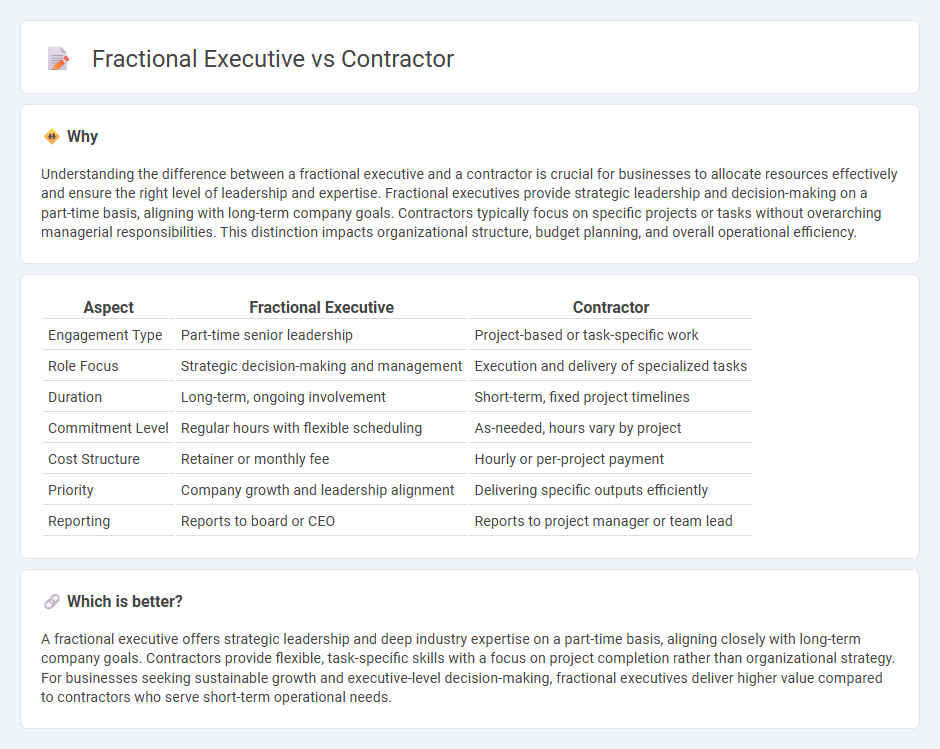
Fractional executives bring specialized leadership to companies on a part-time basis, offering strategic guidance without the full-time commitment, whereas contractors typically provide specific project-based skills or services for limited durations. Fractional executives focus on long-term business growth and leadership continuity, while contractors deliver targeted expertise to address immediate needs or technical challenges. Explore the key differences and benefits of fractional executives versus contractors to optimize your talent strategy.
Why it is important
Understanding the difference between a fractional executive and a contractor is crucial for businesses to allocate resources effectively and ensure the right level of leadership and expertise. Fractional executives provide strategic leadership and decision-making on a part-time basis, aligning with long-term company goals. Contractors typically focus on specific projects or tasks without overarching managerial responsibilities. This distinction impacts organizational structure, budget planning, and overall operational efficiency.
Comparison Table
| Aspect | Fractional Executive | Contractor |
|---|---|---|
| Engagement Type | Part-time senior leadership | Project-based or task-specific work |
| Role Focus | Strategic decision-making and management | Execution and delivery of specialized tasks |
| Duration | Long-term, ongoing involvement | Short-term, fixed project timelines |
| Commitment Level | Regular hours with flexible scheduling | As-needed, hours vary by project |
| Cost Structure | Retainer or monthly fee | Hourly or per-project payment |
| Priority | Company growth and leadership alignment | Delivering specific outputs efficiently |
| Reporting | Reports to board or CEO | Reports to project manager or team lead |
Which is better?
A fractional executive offers strategic leadership and deep industry expertise on a part-time basis, aligning closely with long-term company goals. Contractors provide flexible, task-specific skills with a focus on project completion rather than organizational strategy. For businesses seeking sustainable growth and executive-level decision-making, fractional executives deliver higher value compared to contractors who serve short-term operational needs.
Connection
Fractional executives and contractors both offer businesses flexible, specialized expertise without long-term commitments, enabling cost-effective staffing solutions. Fractional executives provide strategic leadership on a part-time basis, while contractors deliver project-specific skills and support. This synergy helps companies scale operations and address skill gaps efficiently.
Key Terms
Employment Status
Contractors operate as independent entities, offering specialized services without becoming company employees, while fractional executives hold a part-time or temporary leadership role within an organization, often with more integrated responsibilities and company alignment. Employment status for contractors typically involves self-employment with no employee benefits, whereas fractional executives may receive certain perks and closer collaboration despite not being full-time staff. Explore further distinctions to understand which model best suits your business needs and organizational goals.
Scope of Responsibility
Contractors typically handle specific projects or tasks with clearly defined deliverables, limiting their scope of responsibility to short-term objectives. Fractional executives take on broader roles, engaging in strategic decision-making and ongoing leadership across multiple departments or functions. Explore the key differences in scope of responsibility to determine which option best fits your organizational needs.
Compensation Structure
Contractors typically receive fixed fees or hourly rates based on project scope, while fractional executives often engage through retainer agreements or equity incentives linked to company performance. The compensation structure for fractional executives aligns their interests with long-term business goals, contrasting with the task-oriented payment model for contractors. Explore detailed comparisons to determine the best fit for your organizational needs.
Source and External Links
What Are Contractors and What Do They Do? - Indeed - A contractor is a person hired to perform specific tasks for construction projects, including general contractors, subcontractors, and independent contractors who work for themselves and manage projects or parts of projects.
Contractor - Wikipedia - A contractor is a person or company that performs work based on a contract, including roles such as general contractor, independent contractor, subcontractor, and government contractor, covering a wide variety of business roles.
Independent contractor defined | Internal Revenue Service - An independent contractor is a self-employed individual who performs work where the hiring party controls only the result of the work but not the method, with tax obligations distinct from employees.
 dowidth.com
dowidth.com